
CEDAR FALLS, Iowa (July 21, 2025) United Faculty, the faculty union at the University of Northern Iowa, has joined with the new Iowa Higher Education Coalition to launch a statewide petition for Iowa citizens to urge the Iowa Board of Regents to firmly reject efforts to restrict what students can learn at Iowa’s public universities.
The Iowa Higher Education Coalition includes the following organizations:
- Iowa State AAUP (American Association of University Professors)
- UNI United Faculty, AAUP/AFT Local 6752
- University of Iowa AAUP
- UE Local 896 – COGS (Campaign to Organize Graduate Students), University of Iowa
- Iowa Federation of Labor, AFL-CIO
“We want to enable students, parents, alumni, faculty, staff, and Iowans across the state to be able to use the petition to register their concerns about efforts to restrict what students can learn at the University of Iowa, Iowa State, and UNI,” said Christopher R. Martin, a professor of communication and media at UNI and president of United Faculty.
The petition is available at https://actionnetwork.org/petitions/preserving-educational-quality-and-the-freedom-to-learn-at-iowas-public-universities
In June 2025, the Iowa Board of Regents proposed a policy to prohibit required courses if the Board determined they contained “substantial content” on a broad array of topics related to the ill-defined categories of “Diversity, Equity, and Inclusion” or “critical race theory.”
The policy would have affected students enrolled in many degree programs, including nursing, medicine, public health, education, social work, sociology, law, political science, criminology, philosophy and world religions, and others. Students in certain fields—such as social work and nursing—would have been at a special disadvantage, since those professions’ standards require graduates to show competency in various topics banned under the policy.
Finally, the policy would have given the Board sole authority to reject or approve course content, putting them in the unprecedented (and impractical) role of serving as a censor for Iowa’s entire public university system.
Following widespread criticism, the Board withdrew the June version of the proposed policy. However, the Board is continuing to consider next steps, and may introduce a revised proposal at their next Board meeting on July 30.
The BOR’s proposed policy violates the Iowa Board of Regents’ existing Freedom of Expression Policy. That policy states “the universities must strive to ensure the fullest degree of intellectual freedom and free expression allowed under the First Amendment to the Constitution of the United States,” and that “it is not the proper role of the Regent universities to shield individuals from speech protected by the First Amendment to the Constitution of the United States, which may include ideas and opinions the individual finds unwelcome, disagreeable, or even offensive.”
United Faculty, established in 1976 and representing more than 500 faculty members, is the chief negotiating agent for the University of Northern Iowa’s faculty, and is affiliated with the American Association of University Professors/American Federation of Teachers (AAUP/AFT).
UF Speaks Up in Defense of Free Speech in the Classroom
UF President Chris Martin’s comments on June 11, 2025 to the Iowa Board of Regents on behalf of 500 UNI faculty members to oppose the Board’s proposed anti-DEI and anti-critical race theory policy that would censor instructors.
UNI’s Faculty Union Opposes Board of Regents Proposal to Censor Classroom Topics

The BOR’s anti-DEI and critical race theory proposal violates the First Amendment
(CEDAR FALLS, Iowa) United Faculty, the faculty union at the University of Northern Iowa, strongly opposes a proposed Iowa Board of Regents policy that will censor university faculty and bend Iowa’s public universities and their curricula to an agenda that undermines critical inquiry, free speech, and student choice.
The proposed policy is scheduled for a “first and final reading” and approval at the BOR’s June 11 meeting in Iowa City. Public comments at the BOR meeting are scheduled after the BOR holds its session on the proposed policy. The policy is derivative of two DEI-censorship bills, HF 269 and HF 401, that United Faculty opposed and that were not approved by the legislature in the most recent session that ended last month.
The BOR proposal requires that “a student shall not be required to take a course that has substantial content that conveys DEI or CRT to satisfy the requirements of a major, minor or certificate unless the Board has approved it as an exception.”
“The proposed DEI and CRT requirement explicitly violates the First Amendment of the Constitution of the United States, as it endorses viewpoint discrimination and makes a governmental body — the Iowa Board of Regents — the authority on deciding what kinds of speech topics are appropriate for the classroom,” said Christopher R. Martin, a professor of communication and media at UNI and president of United Faculty.
“The content rules disrupt appropriate and relevant academic speech in major, minor and certificate programs, including those in nursing, public health, education, social work, sociology, media studies, women’s & gender studies, political science, criminology, English literature, philosophy and world religions, and number of other disciplines,” Martin said. “For example, it would be impossible to talk about the contemporary relevance of the 14th Amendment, current health system disparities based on gender and race, or the inequities in the incarceration system without substantially engaging in topics for which the BOR would be the government censor.”
The proposed policy defines diversity, equity and inclusion as “instruction that conveys the following concepts as primary principles: unconscious or implicit bias, cultural appropriation, allyship, transgender ideology, microaggressions, group marginalization, antiracism, systemic oppression, social justice, heteronormativity, gender theory, racial privilege or sexual privilege.” Critical race theory is defined as “an academic and legal framework that denotes that systemic racism is part of American society and is embedded in laws, policies and institutions.”
The BOR proposal comes after the legislature just established a Center for Intellectual Freedom at the University of Iowa. Similar civic education centers have been established at Iowa State and UNI.
“Ironically, the BOR’s proposed policy violates the Iowa Board of Regents’ own Freedom of Expression Policy, Martin said. The BOR Freedom of Expression policy states “the universities must strive to ensure the fullest degree of intellectual freedom and free expression allowed under the First Amendment to the Constitution of the United States,” and that “it is not the proper role of the Regent universities to shield individuals from speech protected by the First Amendment to the Constitution of the United States, which may include ideas and opinions the individual finds unwelcome, disagreeable, or even offensive.”
United Faculty, established in 1976 and representing more than 500 faculty members, is the chief negotiating agent for the University of Northern Iowa’s faculty, and is affiliated with the American Association of University Professors/American Federation of Teachers (AAUP/AFT).
UNI’s Faculty Union Opposes Radical Bills Targeting Higher Education

Bills Would Censor Faculty and Undermine Critical Inquiry, Free Speech, and Student Choice
April 10, 2025 Update: HF 269 did not make the second “funnel” on April 4, so that bill is dead for this session. HF 295 and HF 401 remain active.
March 26, 2025
(CEDAR FALLS, Iowa) – United Faculty, UNI’s faculty labor union, opposes several bills that recently passed Iowa’s House and would severely damage the University of Northern Iowa, Iowa State, and the University of Iowa if approved by the Iowa Senate.
The three bills, HF 269 (the “Freedom from Indoctrination Act), HF 295 (the “Accreditation Autonomy Act” and HF 401 (the “Core Curriculum Act”) all seek to censor university faculty and bend the universities and their curriculum to an agenda that undermines critical inquiry, free speech, and student choice.
“These bills all censor university faculty and prohibit the discussion of a number of basic topics having to do with race, gender, and inequality in majors, minors, and individual courses,” said Christopher Martin, president of United Faculty. “These bills destroy the essence of college education: Open critical inquiry, free speech, and the ability of students to make their own decisions in what they want to study. Instead, the bills endorse a radical agenda that seeks to muzzle free speech and violate the First Amendment.”
The three bills that would do great harm to Iowa’s public universities:
This bill prohibits academic content that “Promotes the idea that racially neutral or colorblind laws, policies, or institutions perpetuate oppression; injustice; race-based privilege, including white supremacy or white privilege; or inequity by failing to actively differentiate on the basis of race, sex, or gender” for academic programs, majors, minors, or certificate requirements. In other words, the state government would exercise prior restraint (the legal definition of censorship) over what a faculty member can teach in a course or academic degree program.
The bill is an existential threat to academic areas like sociology, social work, political science, communication and media, English, psychology, education, history, and other programs. If instructors can’t speak about these topics, they can’t teach their programs’ required courses – and their students can’t learn. Thousands of tuition-paying students across all three universities could potentially lose their majors or minors because the central subject area or those majors or minors would be prohibited. It also will harm state universities’ chances of recruiting out-of-state students (undergraduate and graduate) who wish to study in these fields if Iowa’s public universities cannot offer the expected curricula within their disciplines. Students will go elsewhere.
This bill puts UNI’s accredited programs at a disadvantage compared to universities in other states. The state of Iowa’s proposed academic program standards would be in conflict with the high national standards of accrediting agencies, which review and put their stamp of approval on university programs across the country.
With this bill, the regents universities would be prohibited from complying with the high standards of national accrediting agencies, and would have to adhere to state’s lower standards that require, for example censorship of material in a number of disciplines (see HF 269).
UNI’s faculty, staff, and students just spent five years and a lot of money building a state-of-the-art general education curriculum called UNIFI – UNI Foundational Inquiry – which debuted in 2022. (See https://undergraduatestudies.uni.edu/unifi). The UNIFI curriculum requires students to take general education courses from seven areas. While doing so, students are also enabled to earn one of the resumé-friendly certificates that are built into the program, one of the many components lacking in the legislature’s top-down general education bill. The UNIFI program built student choice into the design, where students are not forced to take courses but given a variety of options across fields of study to complete the curriculum.
Unfortunately, the language of HF 401 proposes that all three Iowa regents universities adopt a much more limited general education program created by a New York City-based organization that seeks to have all 50 states conform to its political plan.
The bill again censors faculty, prohibiting content “that teaches identity politics or is based on theories that systemic racism, sexism, oppression, or privilege are inherent in the institutions of the United States of America or the state of Iowa.”
How, for example, will censored instructors be able to explain the historic events of the 14th Amendment (1868) giving citizenship rights and equal protection under the law to Black Americans), and the 19th Amendment (1920) giving women the right to vote, without explaining the systemic racism and sexism inherent in the institutions of the U.S. at that time?
Overall, these three bills threaten the core and mission of Iowa’s universities.
“These laws would do great harm to the national standing of Iowa’s regents universities,” said Robert Earle, vice president of United Faculty. “Iowa taxpayers have supported building three of the finest higher education institutions in the country. But these bills would cut against those hard-won reputations as aspiring students will not want to attend universities that are operated under government-enforced censorship.”
Iowa’s public universities have a broad mission and an enormous economic impact on the state.
The Iowa Code requires that the University of Northern Iowa “offer undergraduate and graduate courses of instruction, conduct research and provide extension and other public services in areas of its competence to facilitate the social, cultural and economic development of Iowa.”
According to the Iowa Board of Regents, the three state universities collectively account for at least $15 billion annually to the state of Iowa economy.
United Faculty, established in 1976, is the chief negotiating agent for the University of Northern Iowa’s faculty, and is affiliated with the American Association of University Professors (AAUP) and American Federation of Teachers (AFT). The labor union represents more than 500 faculty members on UNI’s campus.
WHY YOU SHOULD JOIN UF AND SUPPORT OUR WORK
- Together we are stronger. Your solidarity helps us achieve more for ALL faculty.
- UF enjoys broad support among faculty. In our Fall 2018 recertification vote, 547 faculty voted yes to support UF and only 17 voted no. In the following recertification vote in Fall 2020, 97.5% of those voting supported UF with a YES vote! And again, in Fall 2022, 97% of faculty voting supported United Faculty, and 98.3% in Fall 2024!
- UF collaborates effectively with other faculty leaders and administration to solve problems, create fair policies, and to protect your rights and fair working conditions
- As UNI confronts budget challenges, as a new faculty evaluation system is rolled out, and as our general education curriculum is revised, the potential for serious threats to faculty abounds. We need a strong union to stand up for faculty, and we need you with us.
- More than 80% of our dues go to our membership in American Association of University Professors (AAUP) or our legal counsel. Both of these have been powerful assets and critical allies.
RECENT UF WINS:
- We spoke out for UNI faculty in 2025 as public universities, faculty free speech and academic freedom came under attack by the state. We also spoke up for international students and faculty, who risked being deported with no due process.
- UF did the comparative research on the state of UNI faculty salaries, and won salary increases. As recently as 2016, UNI faculty salaries kept up with our peer institutions, but in less than a decade, we have fallen behind. Our 2024 research found that UNI faculty salaries at all ranks combined are only 87.3% of UNI’s peer institutions’ average. Our work earned 3% wage increases (the effective maximum by law) in 2023-2025 contract, and in the 2025-2027 contract.
- UF helped to create new academic titles for term, renewable term, and adjunct faculty. In 2023, United Faculty moved the process forward by conducting a survey regarding new academic titles at UNI. More than 300 faculty responded to our survey, and about 75% of faculty respondents were in support of the professor of instruction, professor of practice, and clinical professor titles. Our efforts helped to move forward the adoption of the new academic titles.
- UF leaders’ work in collaboration with other faculty and administrators on the Faculty Handbook Committee has resulted in:
-
- A new handbook chapter that preserves due process rights for faculty who are disciplined or terminated. Pressure from a case letter from the American Association of University Professors (AAUP) that UF solicited was instrumental in instigating and approving this policy.
- A new promotional ladder for temporary, term, and renewable term faculty that went into effect in 2023. (If you are a temporary, term, or renewable term faculty member and would like our advice or assistance on promotion, please contact us.)
- New handbook language for more flexible office hours (such as online hours) as a new post-COVID norm.
- New timetable language so that annual PAC evaluations of renewable term faculty are not required after six years.
- UF collaborated with the University Benefits Committee to reduce costs to the plan, resulting in only small increases to health care premiums for two years.
- Preserved faculty ownership of online curriculum and secured paid summer training for online pedagogy and curriculum development.
- UF communicated faculty displeasure with the lengthy paperwork for filling out the annual Faculty Activity Report, and worked with the Provost’s office to substantially reduce annual reporting requirements.
- Each year, UF assists and advocates for 75-100 faculty-related issues ranging from major discipline, discrimination, termination, denial of tenure, evaluation issues, insurance issues, teaching assignments, office assignments, OCEM investigations, travel questions, search issues, and many other smaller issues.
We never stop working to ensure that UNI supports faculty development, rewards faculty excellence, and safeguards faculty academic freedom. Not a member? Contact President Chris Martin for details on how to join at martinc@uni.edu.
NOW FOCUSING ON:
- Early tenure and promotion
- Over-enrolled class compensation
- Child and adult care availability in the Cedar Valley
- Less paperwork for annual evaluations
- Academic funding
